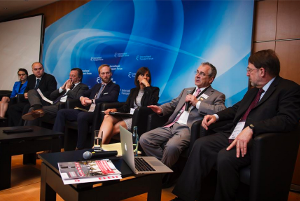 On 23 May 2014, a group of experts presented and discussed on “National Urban Transport Policy: Enabling More Sustainable Development in a Changing World” within this year’s International Transport Forum (ITF) in Leipzig.
On 23 May 2014, a group of experts presented and discussed on “National Urban Transport Policy: Enabling More Sustainable Development in a Changing World” within this year’s International Transport Forum (ITF) in Leipzig.
Colin Hughes, Director of National Policy and Project Evaluation ITDP, presented on a new Comparative Analysis of Rapid Transit Growth, Investment & Access and introduced the so-called Rapid Transit to Resident Ratio as an indicator to compare access to rapid transit across cities, countries or years (download the study here).
Download his presentation here: “IDTP Hughes (2014) ITF Side Event, Comparative Analysis of Rapid Transit”
Urda Eichhorst, Project Manager, Deutsche Gesellschaft für Internationale Zusammenarbeit (GIZ) then summarised findings from an International Review of Sustainable Urban Transport Financing Policies and Programmes (download the study here), emphasizing and illustrating the potential of national urban transport financing policies to lift sustainable urban transport developments to a new scale.
Download her presentation here: “GIZ Eichhorst (2014) – ITF Side Event Financing Urban Transport”
Next, Sir Peter Hendy, Commissioner of Transport for London, Marcelo Cintra, Manager of Sustainable Policy at Belo Horizonte’s Transport Department, Mariana Orozco, Strategy Coordinator Urban Transport in the Mexican Ministry of Agricultural, Land and Urban Development (SEDATU) and Alain Flauch, UITP General Secretary all reported on their respective experiences and thoughts on how to design effective National Urban Transport Policy.
It was emphasized that cities require national level support to develop high-quality sustainable urban transport systems and that there is no one size fits all approach, but that financing mechanisms need to fit the historic, cultural, and institutional setting, as well as the technical capacities in countries. Good practice elements can be transferred, but need to be adapted to fit into local contexts and be effective. The case of Belo Horizonte also illustrated that even where political leadership is strong, implementing good practice on the ground is not done overnight. A change of minds is required not only amongst policy makers, but also city planners, transport engineers and not least transport users to move away from car-oriented development in cities.
It became clear that many good practices already exist that should be scaled up, but that more and continued efforts are needed to replicate good practices on a large scale and in a reasonable short period of time. Alain Flauch suggested that advocates of sustainable national urban transport financing mechanisms team up with lawyers and tax experts to table convincing proposals to national governments.
The event was jointly organised by the Institute for Transportation & Development Policy (ITDP), the International Association of Public Transport (UITP), the Deutsche Gesellschaft für Internationale Zusammenarbeit (GIZ) GmbH and Bridging the Gap (http://www.transport2020.org/). Michael Replogle, Managing Director for Policy and Founder ITDP moderated the session.




Comments are closed.